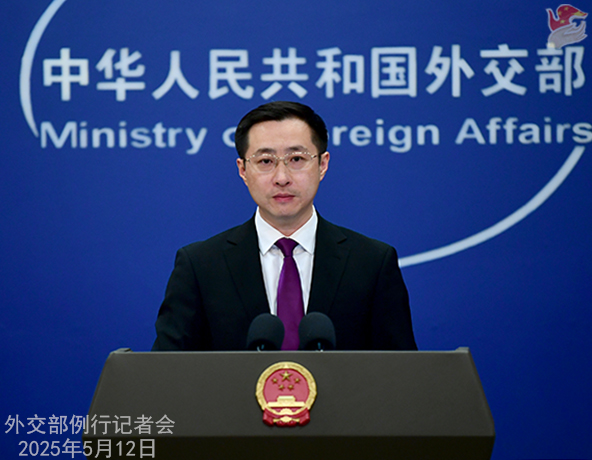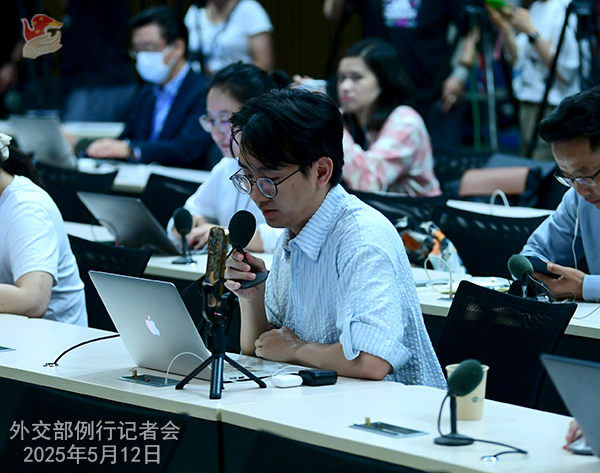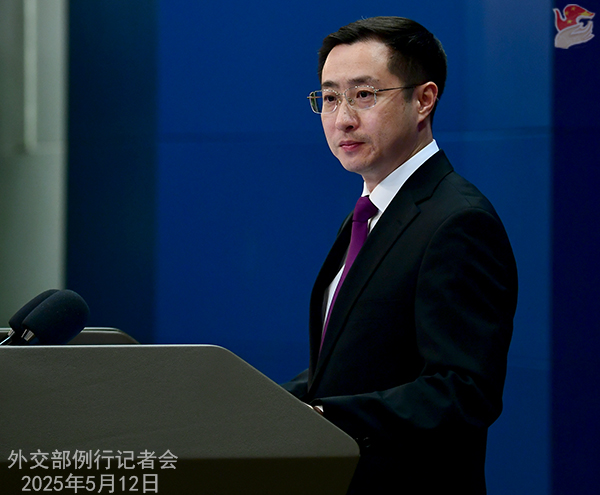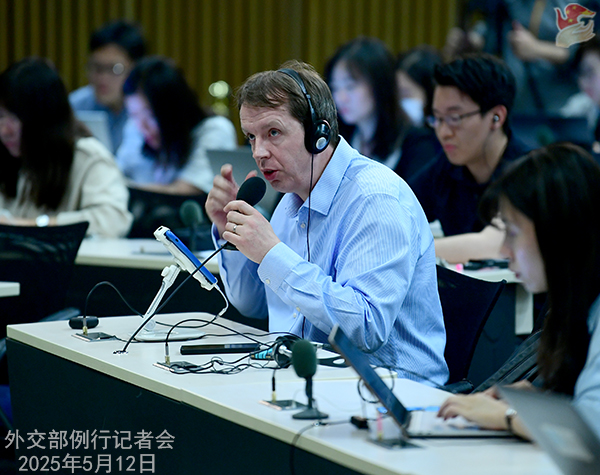
People’s Republic of China


CCTV: During the state visit to Russia and the celebrations marking the 80th Anniversary of the Victory in the Great Patriotic War of the Soviet Union, President Xi Jinping and President Vladimir Putin signed the Joint Statement on Further Deepening the China-Russia Comprehensive Strategic Partnership of Coordination for the New Era, and issued the Joint Declaration on Further Strengthening Cooperation to Uphold the Authority of International Law. President Xi also held bilateral meetings with leaders of multiple countries, during which they had communication and coordination on carrying forward a correct historical perspective on WWII, staying true to multilateralism and defending international fairness and justice. With the post-war international order facing risks and challenges, what is the unique importance that lies in defending the outcomes of the victory of WWII?
Lin Jian: President Xi Jinping’s trip to Russia was a full success, which included a state visit to Russia and attending the celebrations marking the 80th anniversary of the victory of the Soviet Union’s Great Patriotic War. China has released information about the details of the visit, and Foreign Minister Wang Yi has given a comprehensive and in-depth overview of the visit to the media.
This year marks the 80th anniversary of the victory of the Chinese People’s War of Resistance Against Japanese Aggression and the World Anti-Fascist War. Eighty years ago, China made great national sacrifices and decisive contributions to the victory of the Anti-Fascist War together with the progressive forces around the world including the Soviet Union. Key members of the anti-Fascist alliance, including China, jointly agreed to establish the United Nations, formulated the UN Charter, and opened the historic chapter of countries uniting for peace and development.
The painful lessons of WWII show that militarist aggression, power politics and bullying acts are definitely not the way of peace. Zero-sum game and the winner-takes-all mentality are not the path toward development. Only when all countries join hands to safeguard the international system with the UN at its core, the international order underpinned by international law and the basic norms governing international relations based on the purposes and principles of the UN Charter, defend international fairness and justice, and keep pursuing an equal and orderly multipolar world and a universally beneficial and inclusive economic globalization, can the vision of “saving succeeding generations from the scourge of war” in the preamble of the UN Charter become a reality and can human society truly achieve peace, stability, progress and development.
As President Xi Jinping pointed out, the more complex the international landscape is, the greater the need to stay committed to and defend the authority of the UN. As the first country to put its signature on the UN Charter and a permanent member of the UN Security Council, China will never allow the world to return to the law of the jungle where might is right. We will work with the international community to jointly defend the outcomes of the victory of WWII, stay committed to true multilateralism, safeguard the hard-won peace and strive for an even brighter future for humanity.
Xinhua News Agency: On China’s announcement of Brazilian President Luiz Inácio Lula da Silva’s visit to China, how does China view its current relations with Brazil? Could you share with us the program and China’s expectation for the visit?
Lin Jian: China and Brazil are both major developing countries and emerging markets. Both are BRICS members, and important members of the Global South. The relations between China and Brazil have always been at the forefront of China’s relations with fellow developing nations. Last year, amidst bilateral celebrations for the 50th anniversary of diplomatic ties, President Xi Jinping paid a successful state visit to Brazil and the two presidents announced joint efforts to build a China-Brazil community with a shared future for a more just world and a more sustainable planet, and to seek synergy between China’s Belt and Road Initiative and Brazil’s development strategies, ushering in a new stage for China-Brazil relations.
President Lula da Silva is an impactful leader of a major Latin American country and seasoned global statesman. The visit is President Lula da Silva’s sixth visit to China and his second visit to China since 2023. China believes that in light of all the changes and turbulence in today’s world, this visit carries special significance. It will enrich the strategic substance of the China-Brazil community with a shared future, and demonstrate the firm resolve and sense of responsibility of the two countries in driving towards greater solidarity and coordination among Global South countries and making the region and the world more stable and prosperous.
While in China, President Lula da Silva will attend the opening ceremony of the Fourth Ministerial Meeting of the China-CELAC Forum and other events. China attaches great importance to Brazil’s vital role in Latin American and Caribbean affairs, and stands ready to work with Brazil for new progress in building the China-CELAC community with a shared future.

RIA Novosti: Russian President Putin proposed on May 11 to unconditionally resume negotiations with Ukraine, saying that new ceasefire might be agreed upon during the negotiations. What is China’s comment on this?
Lin Jian: China’s position on the issue of the Ukraine crisis is consistent and clear. We support all efforts for peace. We hope that relevant parties will continue to work for the conclusion of a fair, lasting and binding peace deal that is accepted by all parties concerned through dialogue and negotiation and ultimately realize the political settlement of the Ukraine crisis.
Bloomberg: We understand that as a result of the talks in Switzerland, China will lower tariffs on U.S. goods to 10 percent from 125 percent for 90 days and the U.S. will cut its tariffs on Chinese goods to 30 percent for 90 days. Can you comment on the outcome of the negotiations in Switzerland? (A similar question was asked by China-Arab TV)
Lin Jian: Regarding the China-U.S. high-level meeting on economic and trade affairs, the Chinese side has issued a readout, and the two sides have just released a joint statement reached at the meeting, which you may refer to.
Kyodo News: Yesterday the Japan Coast Guard said they found a Chinese research vessel around “Senkaku Islands” of Okinawa Prefecture, and the vessel lowered a pipe-like object into the sea within Japan’s exclusive economic zone. The Japan Coast Guard urged to stop this activity. What is the purpose of the research vessel? What is the Chinese Foreign Ministry’s comment on this issue?
Lin Jian: Diaoyu Dao and its affiliated islands have always been China’s territory. It is fully within China’s sovereign rights to have Chinese research vessels carrying out activities in relevant waters.
China News Service: It was reported that India and Pakistan agreed on an immediate ceasefire on May 10. The two sides will hold talks again on May 12. We also noted that Member of the Political Bureau of the CPC Central Committee, Director of the Office of the Central Commission for Foreign Affairs and Foreign Minister Wang Yi spoke with Pakistan’s Deputy Prime Minister and Foreign Minister Ishaq Dar and India’s National Security Adviser Shri Ajit Doval respectively on the night of May 10. Many countries played a positive role in easing the tensions, for which Pakistani Prime Minister Shehbaz Sharif has expressed appreciation. What is China’s comment?
Lin Jian: China noted the reports. The ceasefire between India and Pakistan is in the fundamental and long-term interest of both countries, and is conducive to regional peace and stability. This is also what the international community hopes to see. China supports and welcomes this latest development.
India and Pakistan are and will always be each other’s neighbors. They’re both China’s neighbors as well. Since tensions started to rise between India and Pakistan, China has been in close communication with relevant parties and urged the two countries to exercise calm and restraint, and avoid escalation. On the night of May 10, Member of the Political Bureau of the CPC Central Committee, Director of the Office of the Central Commission for Foreign Affairs and Foreign Minister Wang Yi spoke with Pakistan’s Deputy Prime Minister and Foreign Minister Ishaq Dar and India’s National Security Adviser Shri Ajit Doval respectively to counsel de-escalation and realization of a full and lasting ceasefire. Both Pakistan and India responded positively.
China hopes that India and Pakistan will cement and continue the ceasefire momentum, avoid further conflict, properly handle differences through dialogue and negotiation, and return to the track of political settlement. China is ready to stay in communication with India and Pakistan and play a constructive role in realizing a full and lasting ceasefire between the two countries and keeping the region peaceful and stable.
Ukinform News Agency: Ukraine, European countries and the United States have proposed a 30-day ceasefire starting today. There is no response from Russia but I’d like to ask about the Chinese side’s view on such an initiative for a 30-day ceasefire. And the second one: U.S. President Donald Trump called major powers to have more active participation in resolving the Russian-Ukrainian war, he spoke about Türkiye and China in particular. Does the Foreign Ministry have any comment on this?
Lin Jian: As I said just now about China’s position on the Ukraine crisis, we support all efforts for peace, and hope that parties will continue working towards a fair and durable peace deal that is binding and accepted by all parties concerned through dialogue and negotiation, and ultimately achieve a political settlement of the Ukraine crisis.
China remains of the view that dialogue and negotiation is the only viable way out of the crisis. China will continue to, in light of the will of the parties to the conflict, work with the international community to play a constructive role in ultimately solving the crisis and achieving lasting peace.

Bloomberg: An additional question about the talks in Switzerland. I just want to clarify, will China remove any export licensing requirements for rare earth or critical minerals?
Lin Jian: For anything specific of the meeting, I’d refer you to China’s readout and the joint statement by the two sides.
China Daily: It was reported that on May 9, the Taiwan authorities issued wrongful comments on the contribution of the Communist Party of China to the Chinese People’s War of Resistance Against Japanese Aggression, specifically regarding what is said in the China-Russia joint statement. The Taiwan authorities said that the “Republic of China’s sovereignty over Taiwan” was “confirmed in the Cairo Declaration and the Potsdam Proclamation”, that Taiwan “never belonged to the People’s Republic of China” in terms of history, international law and reality, and that “the two sides of the Taiwan Strait being not subordinate to each other” is the status quo in the Taiwan Strait widely known by the international community. What’s your comment on that?
Lin Jian: Relevant rhetoric once again revealed that it is the DPP authorities’ go-to tactic to distort history and facts and spread disinformation. It also shows their nefarious inclination to use any means possible to advance their separatist agenda.
This year marks the 80th anniversary of the victory of the Chinese People’s War of Resistance Against Japanese Aggression, the World Anti-Fascist War, and the restoration of Taiwan. Under the national united front against Japanese aggression advocated and built by the Communist Party of China, Chinese sons and daughters, unintimidated and united in their efforts, made great sacrifices to defeat the Japanese militarists and wrote a heroic chapter of the victory of the Chinese People’s War of Resistance Against Japanese Aggression. Taiwan’s restoration to China in 1945 is a victorious outcome of WWII and an integral part of the post-war international order. A series of instruments with legal effect under international law, including the Cairo Declaration, the Potsdam Proclamation, and the Japanese Instrument of Surrender, all confirm China’s sovereignty over Taiwan, which is solidly rooted in history and the law.
There is but one China in the world, Taiwan is an inalienable part of China’s territory, and the government of the People’s Republic of China is the sole legal government representing the whole of China. Although the two sides across the Taiwan Strait have yet to be reunified, the fact that the Chinese mainland and Taiwan belong to one and the same China and that Taiwan is an inalienable part of China has never and will not be changed. This is the true status quo in the Taiwan Strait. Taiwan is never a country, not in the past, and never in the future.
No matter what the DPP authorities say or do, they cannot change the fact—supported by history and the law—that Taiwan is part of China’s territory, nor can they change the prevailing international commitment to the one-China principle. China will be reunified, and this is unstoppable.
Bloomberg: On a separate topic. Last Friday, the EU’s Ambassador to China said that China had been ignoring European Union’s concerns over trade and economic issues for the past 20 years. Does the Ministry of Foreign Affairs have any comment?
Lin Jian: This year marks the 50th anniversary of the establishment of diplomatic ties between China and the EU. Over the past 50 years, the interaction and dialogue between China and the EU have become increasingly close, with continuously deepened convergence of interest, significant enhancement in the scale and level of cooperation, and effective multilateral coordination. The two sides have established over 70 dialogue mechanisms, engaged in in-depth communication on bilateral cooperation and the two sides’ concerns, and achieved many common understandings, which promoted the sound development of China-EU relations. The annual trade has surged from US$2.4 billion to US$785.8 billion, an over 300-fold increase. The two-way investment stock has grown from nearly zero to US$260 billion. China’s unilateral visa-free policy has benefited 24 EU member states.
Facts have proven that China and Europe have helped each other succeed and achieved common development. The China-EU Comprehensive Strategic Partnership has not only brought tangible benefits to the nearly 2 billion people in China and Europe but also set a fine example for mutually beneficial cooperation in the era of economic globalization.




